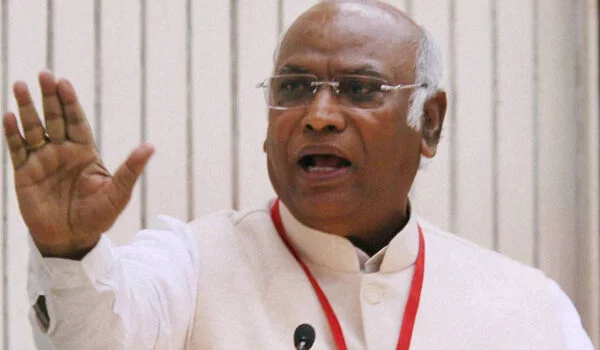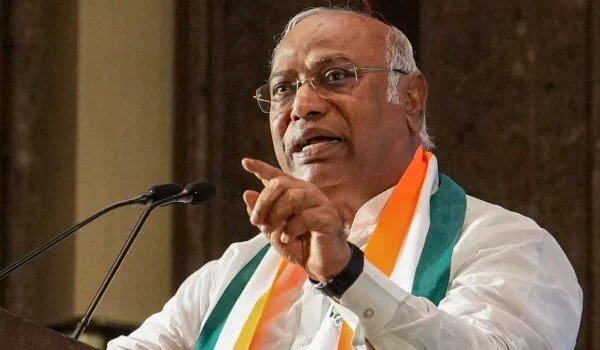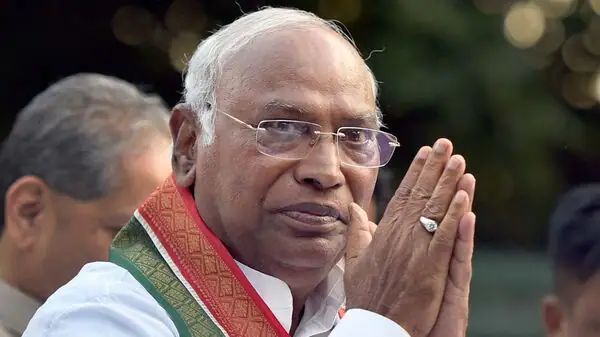
Shri Mallikarjun Kharge
Mapanna Mallikarjun Kharge (born 21 July 1942) is an Indian politician, who is the current President of the Indian National Congress since 2022 and a Member of Parliament of the Rajya Sabha from Karnataka since 2020. He currently serves as the leader of the opposition in the state. Meeting from 17 December 2022. He was also the Leader of the Indian National Congress, Lok Sabha, from 2014 to 2019, and the Chairman of the Public Accounts Committee (India) from 2016 to 2019. He was previously the Railway Minister and Labor Minister from 2013 to 2014. And employment in the Government of India from 2009 to 2013. Kharge was the Member of Parliament from Gulbarga, Karnataka from 2009 to 2019. He was also the general secretary of the All India Congress Committee and in-charge of Maharashtra from 2018 to 2020.
Early life
Mallikarjun Kharge was born in a Dalit family in Varavatti, Bhalki taluk, Bidar district, Karnataka.
In 1948, Kharge lost his mother and sister in a fire set by the Razakars or the private militia of the Nizam of Hyderabad, while he himself narrowly escaped death at the age of 7. He completed his schooling from Nutan Vidyalaya, Gulbarga and received a Bachelor of Arts degree from Government College, Gulbarga and a law degree from Seth Shankarlal Lahoti Law College, Gulbarga. He started his legal practice as a junior in the office of Justice Shivraj Patil and fought cases for labor unions early in his legal career.


Political Career
Kharge started his political career as a student union leader while he was in Government College, Gulbarga, when he was elected as the general secretary of the student body. In 1969, he became the legal advisor to the MSK Mills employees union. He was also an influential trade union leader of the Samyukta Mazdoor Sangh and led several movements fighting for workers’ rights. In 1969, he joined the Indian National Congress and became the President of Kalaburagi Town Congress Committee
Rise in the political scene of Karnataka
He first contested the Karnataka State Assembly elections in 1972 and won from Gurmitkal constituency. In 1973, he was appointed Chairman of the Octroi Abolition Committee, which dealt with the question of reviving the economy of municipal and civic bodies in the state of Karnataka. Based on its report, the then Devaraj Urs government abolished octroi duty on several points. In 1974, he was appointed Chairman of the state-owned Leather Development Corporation and worked to improve the living conditions of thousands of cobblers engaged in the leather tanning industry. During this period, work sheds cum residences were built across the state for their benefit. In 1976, he was appointed Minister of State for Primary Education, during which, more than 16,000 backlog vacancies of SC/ST teachers were filled by direct recruitment into service. Under the Grants-in-Aid Code, grants were given for the first time to schools run by SC/ST management.
In 1978, he was elected MLA for the second time from Gurmitkal constituency and was appointed Minister of State for Rural Development and Panchayat Raj in the Devaraj Urs ministry. In 1980, he became the Revenue Minister in the Gundu Rao cabinet. During this time, the focus was on effective land reforms, which resulted in the granting of tenure rights to millions of landless farmers and labourers. More than 400 land tribunals were formed to expedite the transfer of land rights to farmers. In 1983, he was elected to the Karnataka Legislative Assembly from Gurmitkal for the third time. In 1985, he was elected to the Karnataka Assembly from Gurmitkal for the fourth time and was appointed Deputy Leader of the Opposition in the Karnataka Assembly.
In 1989, he was elected to the Karnataka Legislative Assembly from Gurmitkal for the fifth time. In 1990, he joined Bangarappa’s cabinet as Minister of Revenue, Rural Development and Panchayat Raj, portfolios he had held before and brought significant changes. The resumption of the land reform process, which had stalled midway, resulted in hundreds of thousands of acres of land being registered in the names of landless tillers.
Between 1992 and 1994, he was the Minister for Cooperation, Medium and Large Industries in the Veerappa Moily cabinet. In 1994, he was elected to the Karnataka Assembly from Gurmitkal for the sixth time and became the leader of the opposition in the assembly. In 1999, he was elected to the Karnataka Assembly for the seventh time and was a strong contender for the post of Chief Minister of Karnataka. He came under the guidance of S. during a particularly difficult time for Karnataka. M. Krishna became the Home Minister in the cabinet, especially during the kidnapping of the prince by the notorious poacher Veerappan and the Cauvery riots. In 2004, he was elected to the Karnataka Legislative Assembly for the eighth consecutive time and was once again considered a strong contender for the post of Chief Minister of Karnataka. He became the Minister of Transport and Water Resources in the Dharam Singh led coalition government.
In 2005, he was appointed President of Karnataka Pradesh Congress Committee. In the panchayat elections held soon after, the Congress won the highest number of seats compared to the BJP and JD(S), indicating the revival of Congress’s fortunes in rural Karnataka. In 2008, he was elected to the Assembly from Chitapur for a record ninth time. Although the Congress party performed better compared to the 2004 elections, the Congress lost the elections with the defeat of most of the senior leaders. In 2008, he was appointed Leader of the Opposition for the second time.
National Politics
In 2009, Kharge contested the general elections from Gulbarga parliamentary constituency and won the election for the tenth consecutive time.
In the 2014 general elections, Kharge contested and won the Gulbarga parliamentary seat, defeating BJP’s Revu Naik Bellamgi by a margin of 74,737 votes. In June, he was appointed leader of the Congress Party in the Lok Sabha.
In the 2019 general election, Kharge contested from the same parliamentary seat, although this time he was defeated by BJP’s Dr Umesh G. Lost to Jadhav by a margin of 95,452 votes.
On 12 June 2020, Kharge was elected (unopposed) to the Rajya Sabha from Karnataka at the age of 78. On 12 February 2021, Kharge was appointed the Leader of the Opposition in the Rajya Sabha.
Kharge has notably been appointed as an observer by the Congress for several states in the past, including Assam in 2014, Punjab in 2021 and Rajasthan in 2022. He has been criticized for his alleged inability to resolve internal party issues in these three states and hence losses in Assam and Punjab and public embarrassment in Rajasthan.
On October 1, 2022, he filed nomination to contest the presidential election of the Congress party. Shashi Tharoor opposed him and won by 7897 votes. He was the first Congress President in 24 years not to be from the Gandhi family.


